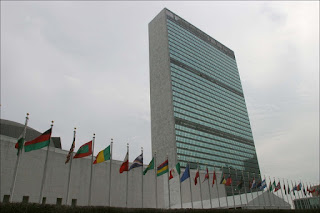The amendment to the UN Resolution Condemning Extrajudicial, Summary, and Arbitrary Executions that removed LGBT people from the list of vulnerable populations was ugly, but so was the U.S. refusal to vote for the whole resolution---not because of the homophobic amendment, but because the UN Rapporteur on Unlawful Execution keeps urging the U.S. to stop unlawfully executing people.
The UN Rapporteur on Extrajudicial, Summary, and Arbitrary Executions, Philip Alston, has criticized the U.S. for its
extrajudicial, summary, and arbitrary killings in Iraq, Afghanistan and Pakistan, including killings with Predator Drones escalated under the Obama Administration, and for the discriminatory use of the death penalty in states like Texas and Alabama.
The UN Rapporteur has also spoken to the complicity of the UN, meaning the Security Council, which includes the U.S., in unlawful killings in Congo. See
Democracy Now, 10.28.2009 .
Burkina Faso, Israel, Libya, the Marshall Islands, the U.S., Sri Lanka, Sudan, Turkey, Tuvalu, Zimbabwe all abstained. The Central African Republic, Chad, Dominica, Equatorial Guinea, Gabon, Gambia, Guinea, Guinea-Bissau, Kiribati, Mauritania, Nauru, Niger, Palau, Sao Tome Principe, Seychelles, Togo, and Tonga, weren't present to vote.
The deletion of LGBT people from the list of vulnerable populations has gotten a great deal of international press; the U.S., Israel, and other nations' abstention on the final resolution virtually none.
This is the U.S. Mission to the United Nations's official explanation:
Explanation of Vote by a U.S. Advisor of Extrajudicial, Summary or Arbitrary Executions Resolution (A/C.3/65/L.29), Third Committee
U.S. Advisor
New York, NY
November 16, 2010
AS DELIVERED
Thank you, Mr. Chairman,
Although we abstained on the adoption of this resolution today, we wish to join the sponsors of the text in condemning extrajudicial, summary or arbitrary executions against all persons, irrespective of their status. We of course agree that all States have obligations to protect human rights and fundamental freedoms and should take effective action to combat all extrajudicial killings and punish the perpetrators. We agree that countries such as ours, which have capital punishment, should abide by their international obligations, including those related to due process, fair trial, and use such punishment for only the most serious of crimes. Indeed, we agree with much of the text of this resolution. However, we have some concerns.
At the outset, let me say that the United States strongly agrees with and appreciates the cosponsors' efforts to retain language specifically condemning ESAs targeting vulnerable groups, particularly members of the LGBT community, and we were dismayed that this reference could not survive an unfriendly amendment.
We also have concerns about the language of the resolution in a few other areas and, therefore, were unable to vote for the resolution as a whole. Much as we agree with the goals and sponsors of the resolution, we are not in a position to vote for a text that obscures a fundamental point: there are not one, but two bodies of law that regulate unlawful killings of individuals by governments - international human rights law and international humanitarian law. As noted by the resolution, these two bodies of law are complementary and mutually reinforce one other. We also recognize that determining what international law rules apply to any particular government action during an armed conflict is highly fact-specific and made even more difficult by the changing nature of warfare. However, the applicable rules for the protection of individuals and conduct of hostilities in armed conflict outside a nation's territory are typically found in international humanitarian law. Rather than clarifying, the resolution as worded only contributes to legal uncertainty about how these two important bodies of law apply to an array of factual circumstances.
Ann Garrison is an independent journalist based in the San Francisco Bay Area. In 2014, she received the Victoire Ingabire Umuhoza Democracy and Peace Prize for her reporting on conflict in the African Great Lakes region. She can be reached (more...)





